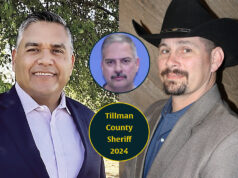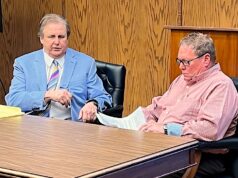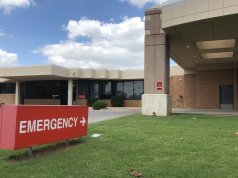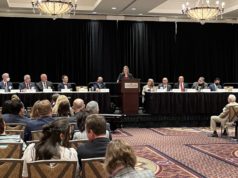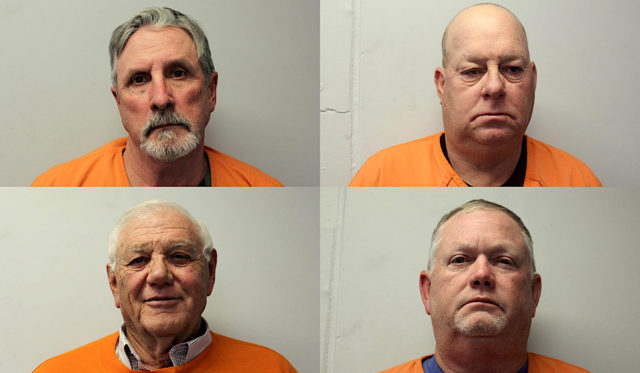
(Update: In March 2023, the counts described below were dismissed and the men were charged with one misdemeanor count of public official neglecting duty and one count of violating the Open Meeting Act. They pleaded no contest and received sentences deferred through March 6, 2027. This article remains in its original form but was also updated to correct a spelling of Joe Don Dickey’s name.)
Four people associated with Circuit Engineering District 7 have been indicted on embezzlement and conspiracy charges related to a business venture called 7 Oil, which was the subject of a state audit released in 2020.
The indictments, issued March 3 by the multi-county grand jury, were brought against current Kiowa County Commissioner and CED 7 President Tim Binghom, Tillman County Commissioner and CED 7 board member Joe Don Dickey, former CED 7 executive director Monte Goucher and Jerry Lynn Dean, who provided consulting services to CED 7.
According to the Lawton-based Southwest Ledger, the four men were booked at the Custer County Sheriff’s Office, in Arapaho, March 8 and released on bonds of $15,000 each.
Oklahoma’s Circuit Engineering Districts were created in 1992 to allow “counties to come together as a cooperative and provide efficiencies that are not available to an individual county,” according to the CED website.
A central function of the CEDs is pooling county resources for road maintenance and construction projects. CED 7 covers 11 counties in western Oklahoma: Beckham, Blaine, Custer, Dewey, Greer, Harmon, Kiowa, Jackson, Roger Mills, Washita and Tillman.
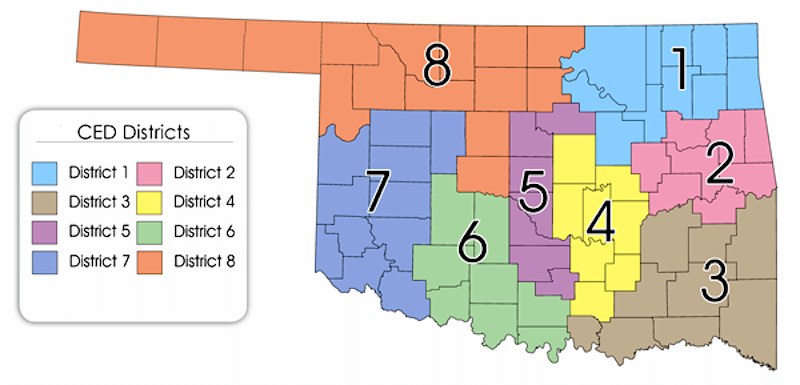
More than $2 million in question
The four indictments contain identical charges, saying the four men embezzled in excess of $2 million by diverting CED funds to “another entity for purposes not intended or authorized.”
Though the “other entity” is not explicitly identified in the embezzlement charge, the conspiracy charge says the four men “willfully, feloniously” conspired to “orchestrate the management, construction, and operation of 7 OIL.”
The embezzlement and conspiracy charges come nearly two years after the release of a state investigative audit that found CED 7 and the CED 7 Authority (an entity that handles certain financial matters and is made up of the CED board members) took out a loan of $2.35 million to open the 7 Oil asphalt emulsion plant in Clinton and “engage in the business of manufacturing and marketing of a proprietary formula road repair and maintenance product.”
According to the audit, which State Auditor & Inspector Cindy Byrd’s office conducted following a request from four district attorneys whose districts cover CED 7, circuit engineering districts are not statutorily authorized to open an asphalt plant or sell road emulsion.
The audit also pointed to a number of procedures and regulations what were not properly followed in the Oil 7 deal. Notably, member counties of CED 7 “incorporated the specific 7 Oil emulsion product into their term bid listings. This impeded vendors, other than the Authority (7 Oil), from either bidding on the product or it prevented them from bidding in a manner that would comply with bid limitations.”
But auditors also discovered that CED 7 member counties were receiving higher bids for 7 Oil than some non-member counties,.
“Although not prohibited, it was also noted that 7 Oil products were bid at higher amounts in the member counties,” the audit stated. “This appears to undermine the objective of the joint venture, which was to reduce costs for CED 7 member counties.”
At the time of the audit’s release in April 2020, Dickey told NonDoc that the 7 Oil plant had been opened because of the difficulty the 11 counties faced obtaining road oil.
“The CED 7 board through our legal counsel and by direction of our executive director (Goucher) guided us through the proper processes and procedures known to them,” Dickey said.
Though the issue is not mentioned in this month’s indictments, the audit also said payments totaling thousands of dollars had been made to Goucher’s wife and son, and the approvals for those payments were not recorded in CED 7 meeting minutes.
During the audit investigation, Goucher was uncooperative, according to the audit report, and said those involved were on a “political witch hunt.”
Attempts to reach sitting county commissioners Binghom and Dickey were unsuccessful prior to the publication of this story. The receptionist at the Tillman County office said the office currently had no way to get in touch with Dickey and referred all questions to Kay County District Attorney Brian Hermanson, who is handling the case’s prosecution after local district attorneys recused.
Attached to the indictments was a list of 21 witnesses who appeared before the multi-county grand jury, including Dickey, Binghom, Goucher and Dean.
The other 17 witnesses were: former Attorney General Mike Hunter, senior deputy attorney general Dawn Cash, District Attorney Mike Fields, assistant district attorney Ricky Mcpherson, District Attorney Angela Marsee, District Attorney Christopher Boring, State Auditor & Inspector Cindy Byrd, assistant state auditor Chryle Wilson, assistant state auditor Sheri Wooldridge, investigative auditor Mick Dodson, Oklahoma Department of Transportation employee Trenton January, Kurt Hamburger, Melvin Salisbury, Debbie Walpole and Gary Brickley.
The arraignments for all four men are scheduled for Friday, March 25.
Read the CED 7 indictments:
(Correction: This article was updated at 5 p.m. Wednesday, March 16, to correct the spelling of Kurt Hamburger’s name, which was listed incorrectly on the indictment documents.)











